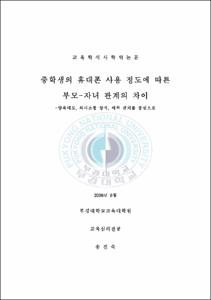중학생의 휴대폰 사용 정도에 따른 부모-자녀 관계의 차이
- Alternative Title
- DIFFERENCES BETWEEN MIDDLE SCHOOL STUDENTS' USE DEGREE OF CELLULAR PHONE AND THEIR PARENT-CHILD RELATION
- Abstract
- The purpose of this study is to verify relationship between middle school students' use degree of cellular phone and their parent-child relation.
The questions for this study were as follows;
First, are there demographic characteristics between overusing and non-overusing group? Second, are there significant differences in child rearing attitude in two groups? Third, are there significant differences in parents-child communication in two groups? Fourth, are there significant differences in parents-child attachment in two groups?
The subjects are the 2nd grade of 352 students who are currently using cellular phones by collecting the samples of 3 middle schools in Busan(1 male middle school, 1 female middle school, 1 co-educational middle school). The device of measurement for realities of using cellular phone was self-made questionnaire, for child rearing attitude was Jong-Seung Lee & Sung Sim-Oh's test(1982) that Ho-Eun Rho(2001) revised, for parent-child communication was Olson & Barns' test reversed and revised by Hye-Young Min(1990), for parent-child attachment was Armsden and Greenberg's test(1987), which was revised and reversed by Jeong Ok(1998), and for overusing of cellular phone was Hye-Jin Jang's test(2002) based on Young's internet addiction test. According to the cellular phone addiction test, this study defined the over-users group of cellular phone(n=90) as upper 25%, the non-overusers group(n=88) as lower 25%. As the methods, the study was conducted through the cross analysis, t-verification.
The results of this study were as follows;
First, the Chai() was carried out not to find out demographic characteristics between two groups, except the economic ability of families. This shows that over-users are apt to use cellular phones more according to the economic ability of families.
Second, significant differences were found in child rearing attitude in two groups. Over-users showed lower mean score both in father's child rearing attitude and in mothers' child rearing attitude, compared with non-over users. Over-users perceived their fathers' and mothers' child rearing attitude negative and regulating.
Third, there were significant differences in parents-child communication. Over-users showed lower mean score in fathers' and mothers' communication, compared with non-over users. They felt their fathers' and mothers' communication pattern more dysfunctional and closed than non-over users.
Fourth, there were significant differences in parent-child attachment.
Over-users had lower mean score in mothers' attachment and father's attachment. Over-users had lower father's and mother's attachment than non-over users. This shows that they felt their parents attachment unstable.
According to the conclusions presented above, there were significant differences between middle school students' use of cellular phone and their parent-child relation. Therefore, this study suggests that parent-education like communication training is necessary to prevent and lessen middle school students' overuse of cellular phone and to keep parent-child relation better.
- Issued Date
- 2008
- Awarded Date
- 2008. 8
- Type
- Dissertation
- Publisher
- 부경대학교 교육대학원
- Alternative Author(s)
- Song, Jin Sook
- Affiliation
- 부경대학교 교육대학원
- Department
- 교육대학원 교육심리전공
- Advisor
- 황희숙
- Table Of Contents
- Ⅰ. 서론 = 1
1. 연구의 필요성 및 목적 = 1
2. 연구문제 = 6
3. 용어의 정의 = 7
Ⅱ. 이론적 배경 = 8
1. 부모-자녀 관계 = 8
2. 휴대폰 과다사용 = 17
3. 부모 자녀 관계와 휴대폰 과다사용의 관계 = 20
Ⅲ. 연구 방법 = 23
1. 연구대상 = 23
2. 연구절차 및 도구 = 24
3. 자료 분석 방법 = 30
Ⅳ. 연구결과 및 해석 = 31
1. 인구학적 특성과 휴대폰 첫 사용 시기 = 31
2. 휴대폰 사용 집단에 따른 부모-자녀 관계의 차이 = 33
Ⅴ. 논의 및 결론 = 40
1. 논의 = 40
2. 결론 및 제언 = 44
참고문헌 = 47
부록 = 55
- Degree
- Master
- Files in This Item:
-
-
Download
 중학생의 휴대폰 사용 정도에 따른 부모-자녀 관계의 차이.pdf
기타 데이터 / 730.74 kB / Adobe PDF
중학생의 휴대폰 사용 정도에 따른 부모-자녀 관계의 차이.pdf
기타 데이터 / 730.74 kB / Adobe PDF
-
Items in Repository are protected by copyright, with all rights reserved, unless otherwise indicated.